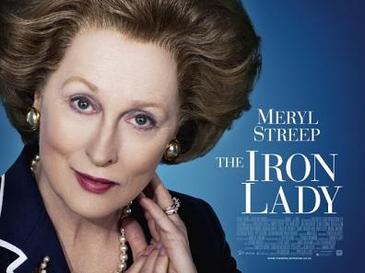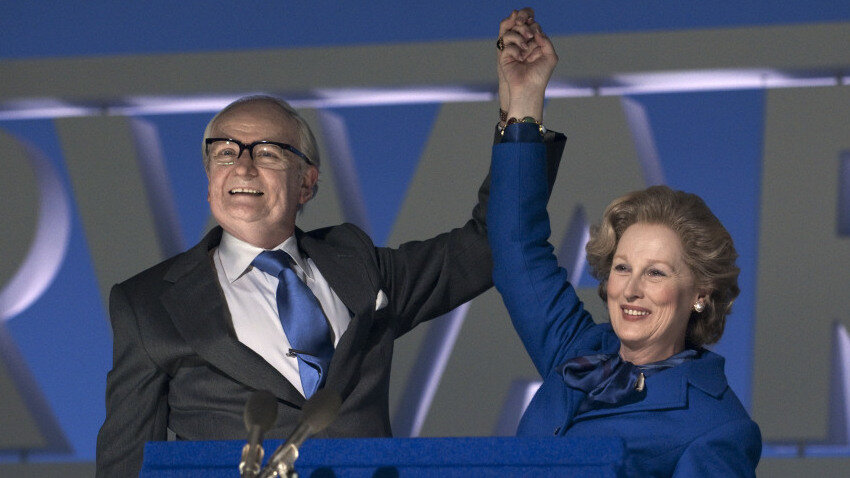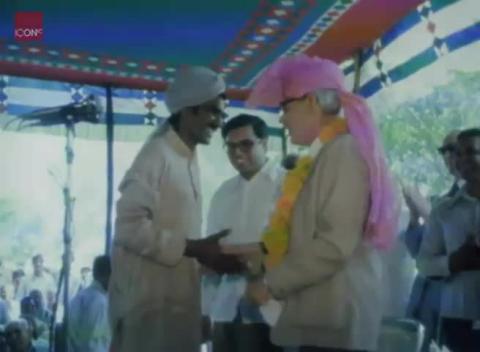 THE IRON LADY
THE IRON LADYMaggie Dearest...
I was led to believe The Iron Lady, the biopic on the life of former British Prime Minister Margaret Thatcher, was going to be a hatchet job. From reports, it would be like The Reagans: the television miniseries too hot for CBS, so hot it had to be exiled to Showtime after the show caused too much of a firestorm.
See Baroness Thatcher as a stark raving mad bonkers slut!
See Sir Denis Thatcher practically in drag!
The Iron Lady begs forgiveness of The Guardian and admits she was all wrong!
The Left Is Avenged!
In truth, The Iron Lady is by no means a hagiography of Thatcher, but it's not a brutal portrayal either. The Iron Lady is actually quite respectful for the most part of Thatcher as both a person and of her time as Prime Minister. Whether this was their intent or not I can only guess. In terms of a film The Iron Lady isn't without some missteps, but they are made up for by some amazing acting.
The film takes place primarily post-Thatcher's 10 Downing Street years, where the Iron Lady herself (Meryl Streep) has become an old, somewhat pathetic lady, wandering the house with only the ghost of her late husband Denis (Jim Broadbent) to keep her company.
As her days go by, little things bring back memories of her life: her youth as Margaret Roberts 'the grocer's daughter', her rise in the Conservative Party, the courtship of Denis and Margaret, and her terms as Britain's first female Prime Minister.
The Iron Lady goes to hit some high and low points of her 11-year reign, ranging from the Winter of Discontent that brought the Conservatives to power through the Falklands War, the IRA bombings, right down to the Poll Tax that so infuriated ordinary Britons that it brought about both a rebellion within her ranks and her eventual resignation as Prime Minister.
 I think this is where one of the great flaws lies in The Iron Lady: Abi Morgan's script jumps around a great deal, so much so that one can't quite get a good grasp of the circumstances that got Thatcher elected or got her forced out.
I think this is where one of the great flaws lies in The Iron Lady: Abi Morgan's script jumps around a great deal, so much so that one can't quite get a good grasp of the circumstances that got Thatcher elected or got her forced out. Everything in Thatcher's life is covered so quickly that we really can't get at who Thatcher was or, save for a few hints about how as a 'grocer's daughter' she was looked down on by the grand old men of the Conservative Party, what motivated her. Even the love story between a young Margaret (Alexandra Roach) and a young Denis Thatcher (Harry Lloyd), was done quite fast albeit well.
Again and again I noted, 'quick to Education Minister, quick rise to power, romance a bit fast' (emphasis mine), which to me denotes that for how remarkably short The Iron Lady itself is at 105 minutes, the actual power of Margaret Thatcher keeps getting lost.
I think it would have helped The Iron Lady tremendously if Morgan's script had kept a stricter focus on certain aspects of Thatcher's tenure. For example, I think a better movie would/could have been made if we had set The Iron Lady at the end of her term, the furor over the Poll Tax and the attempted coup prompting those memories of her rise to power. By setting the film now, in the twilight of her days, with her slipping into dementia and seeing a husband long-dead, it runs the risk of making Thatcher look downright crazy (whether this was the intent of those involved I can't say, only guess).
The flaws in the structure of The Iron Lady force the story to go for a 'greatest hits'-style of storytelling: well, she gets elected, well, somehow she gets to lead the Conservative Party, well, she gets into a war over remote British islands near Argentina, well, she puts forth a taxation plan that no one supports. By going for this, we get few if any hints as to what power Thatcher had for her admirers or passionate hatred she inspired among her detractors. There is always the danger of getting lost in the story if one doesn't already have some knowledge of the Thatcher years or of Thatcher herself.
Of course, there are subtle moments that do tell us something about both the casual sexism the Tories had as well as Thatcher's own tenacity to overcome these hurdles to pursue her own ideology. The credit should go to director Phyllida Lloyd (no relation to Harry Lloyd).
There are wonderful moments of how often she was not taken seriously because she was a woman: when then-Margaret Roberts is casually dismissed to go with the other women after appealing to the Tory bigwigs of her desire to represent the party in Parliament, of how Prime Minister Edward Heath (John Sessions) would not listen to her when he and his Cabinet appeared quick to give in to Labour and their Trade Union allies.
Lloyd also brought great performances and a more interesting and fascinating story from both the younger and older Mr. and Mrs. Thatcher whenever we venture into their own love story. Shall We Dance? from The King & I is almost a running theme whenever Margaret recalls how Denis thrilled her or stood by her, even postmortem. Harry Lloyd and Roach play their scenes beautifully, and credit should also go to Broadbent and Streep whenever they get to show genuine affection.
I digress to say the film falters whenever the very dead Sir Denis reproaches Maggie for anything, from not being as good a mother as she could have been to her attempts to ignore his presence. These are the moments when The Iron Lady comes close to being either flat-out farce or left-wing fantasy come to life: Banquo's ghost pursuing Macbeth.
As for the whole "Denis in a pink turban" business which has caused some consternation, it is both brief and placed within some context though perhaps brought up a bit too often. The mere fact that Denis keeps popping up when we and Maggie know he's dead does make as I've stated Lady Thatcher look downright crazy, which serves only to distract from both a fascinating story and the performances.
Of all the performances in The Iron Lady, Meryl Streep is truly remarkable. Throughout the film, she stays away for the most part from making Thatcher this evil Queen Bitch the Left see her as (which includes Streep herself) . Instead, Streep makes Thatcher a woman who constantly fights against the sexism she encounters. Her gender will not be an obstacle to her principles, even if it means to her surprise that she, Margaret Roberts, grocer's daughter, could, indeed, reach not just Leader of the Conservative Party, but Prime Minister itself.
Despite Streep's politics, she makes Thatcher a heroine, a woman who forced the doors open. Bless Streep for being a professional, even if I figure her wish was to make us hate Thatcher the way she hates Thatcher. The Iron Lady has the opposite effect, unintentional or not.
A side note: Thomas Newman's score was appropriately stirring in the quick rise to her Premiership, a sequence that will thrill conservatives and even stir liberals to be enthralled with the Rise of Woman.
Streep doesn't make Thatcher into a villainness except perhaps when once she becomes so set in bullying her ministers that she does again come close to being a joke in her near wild-eyed look, but instead focuses on how she worked to get the Top Job. Streep comes as close as any actress American or British to not just sounding or looking like Margaret Thatcher (thanks to great make-up work) as anyone could.
In fact, though it is cliched, it is true: there were times in The Iron Lady when you would have thought it was the Margaret Thatcher come back to vanquish the Left and their allies.
Again, the biggest flaw in The Iron Lady is in how the story both jumps around and rushes through both Thatcher's accomplishments and failures. The film may be unfair to focus on her now, debilitated by illness and making it appear that she is today both thoroughly senile if not insane. It would have been better to have had a greater focus on an aspect of her illustrious, extraordinary, and controversial life: her rise to power, the Falklands War, her final days before her overthrow.
What a great scene there could have been with Thatcher going to Buckingham Palace to tender her resignation to the Queen and even getting Dame Helen Mirren for a cameo. The most powerful woman meeting the Monarch, also a woman. What a scene that could have made.
Still, those who love Thatcher should not fear that The Iron Lady paints Margaret Thatcher as an evil or crazy woman for the most part anyway. In fact, I figure conservatives will thrill to see her rise and hear her words that still echo to the hearts of all right-wingers. Sorry, Morrissey...Margaret will not be on the guillotine in The Iron Lady.
For those who hate her, they might enjoy the old lady being a bit dotty, getting criticized by her late husband, but even they may shed a tear when Margaret Thatcher sees her beloved Denis' ghost finally leave her despite her protests.
In short, while it is possible to see The Iron Lady through the prism of one's one politics, as a movie, The Iron Lady should simply be seen.
 |
| Born 1925 |
Oh, where art thou, Maggie?
DECISION: B+


No comments:
Post a Comment
Views are always welcome, but I would ask that no vulgarity be used. Any posts that contain foul language or are bigoted in any way will not be posted.
Thank you.